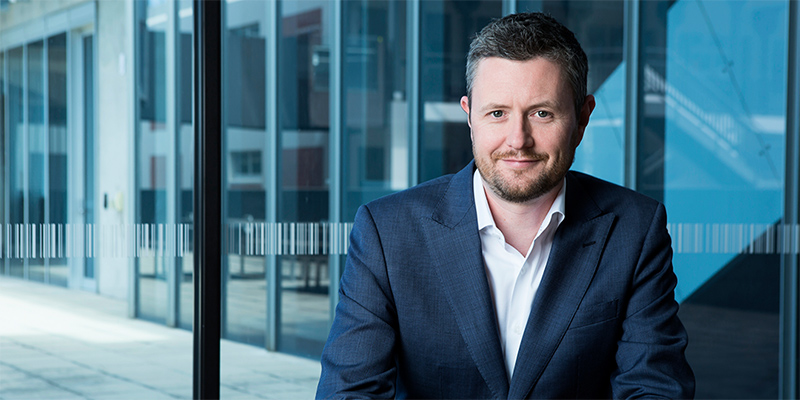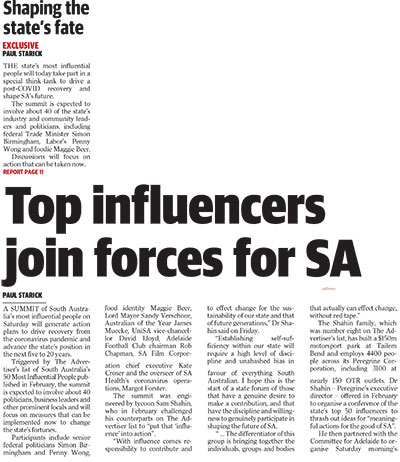From the Vice Chancellor
 INSIDE UNISA
INSIDE UNISAPost COVID-19, do we have an opportunity to reinvent South Australia?
 The Advertiser 1 August 2020
The Advertiser 1 August 2020The pandemic has brought this nation to its knees and finished off what the drought and the bushfires left untouched. But disaster presages creativity and opportunity. Back in 1966 the then US Senator Robert F. Kennedy, addressed the graduating class at the University of Capetown in South Africa.
“There is a Chinese curse which says ‘May he live in interesting times’,” he said. “Like it or not, we live in interesting times. They are times of danger and uncertainty; but they are also the most creative of any time in the history of mankind. And everyone here will ultimately be judged – will ultimately judge himself – on the effort he has contributed to building a new world society and the extent to which his ideals and goals have shaped that effort.”
We’re in that same timeframe now when everything looks so bleak that the only way forward is to re-invent ourselves and re-create the society in which we live.
Recently a group of well-connected South Australians put their heads together to discuss what might happen if we had the opportunity to rethink South Australian business and society. A future South Australia that could, with great creativity and judicious planning, become a beacon of hope for the future. It was a chance to blue sky, to re-position the State post COVID-19 by leveraging the enormous talent and opportunity that we have in this State. We have the brains, the talent and the natural resources and nothing was off the table.
We asked what if? and why not? If we were to start again, what would we do, and how would we go about it?
These are questions that the higher education sector is in a great position to guide. Universities are a national asset, a bank of knowledge that the state and national governments can draw on, a public investment in the future. It is our role to educate the highly skilled professionals that will drive the careers and workplaces of the future, and to create new knowledge for industry and enterprises to grow with.
So, back to the all-important question: what if?
What if we focused all our collective talent and energies on building the sectors that are our current strengths?
The opportunity to help re-grow the State’s economy should pivot around key growth industries which, in South Australia, include food and agribusiness; international education; tourism; energy and minerals; defence and space industries; the high-tech sector; health and medical industries; and creative industries.
There is no reason at all that the State can’t become a national centre for excellence in all of them, although two – international education and tourism – will require critical care to put them back on their feet post COVID.
We already have expertise in minerals and energy in this State, but what if South Australia became a national source for the energy needs of the nation? Can we rethink nuclear energy and produce it efficiently, store it safely and dispose of it wisely?
We have an opportunity to rethink the way we respond to a public health crisis. We have superb health and medical industries in this State; now we have real experience in dealing with a public health crisis so we should be ready with systems and frameworks to deal with the next pandemic. Because there will be more.
We need to be clever. Tossing out processes that no longer work will free us up to grow clever organically and that’s where real progress lies.
We have a chance to rethink what we need from government as we help them incentivise entrepreneurship instead of strangling it with regulations.
UniSA has built much of our success on partnerships with industry and enterprise; they have been true collaborations that make the most of the knowledge we create and the usage to which it is put. Our pursuit of partnerships is only going to get stronger.
But what if the three South Australian universities aggressively collaborated instead of competed? We are all international enterprises that have been hit hard by government funding cuts and the curtailment of international student numbers. We work together on research projects, why not work on ways to build the State’s economy? We could start by planning on how to safely move people into and out of our borders, not just incoming international students, but outgoing academics?
We should also be breathing new life into the places our young people learn, our campuses. We are currently creating the kind of people who will run this new economy and their places of learning should inspire them to create new possibilities for themselves, and for their communities.
And while we’re re-inventing South Australia and building a new economy, we should be building a fairer society as well. This new innovative, creative powerhouse of a State should leave as few people behind as possible. We will have opened the doors to new ideas and given voice to those who have long been silenced by their circumstances.
We need to leave those doors open, keep hearing those voices. As Robert Kennedy said: “everyone here will ultimately be judged – will ultimately judge himself – on the effort he has contributed to building a new world society and the extent to which his ideals and goals have shaped that effort.”
Professor David Lloyd
Vice Chancellor and President
Other Stories
- 35-second body scan could tell you the sport you’re best suited to
- Insects inspire infection resistant dental implants
- Is it a bird, a plane? Not superman, but a flapping wing drone
- Could our beloved Aussie rules footy be turning into soccer?
- From the Vice Chancellor
- Achievements and Announcements
- Health students step up to the plate to help curb Australia’s $170b medical bill
- Remote internships providing students with rewarding experiences
- Video: How to keep your brain healthy
- Which is more creative, the arts or the sciences?
- Local partnership delivers world-leading ‘smarts’ to shipbuilding
- MBA student creates Australia’s most eco-friendly magazine wrap
- Pandemic prompts students to solve challenges creatively
- The latest books from UniSA researchers
- In Pictures: Open August and VC Excellence Awards online event




